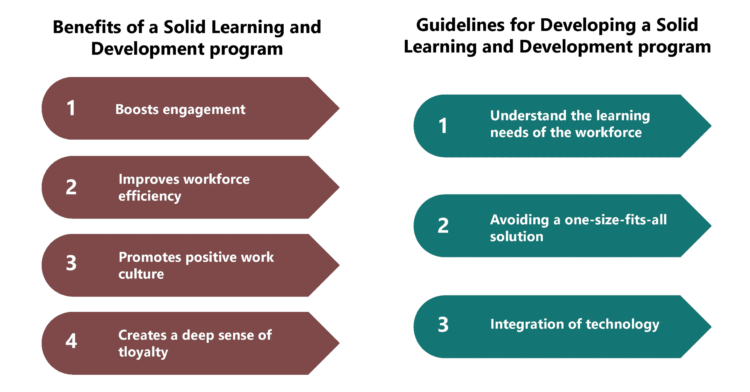1. Boosts Employee Engagement: Offering learning and development opportunities shows employees that the organization values their growth, motivating them to contribute actively and innovate within their roles.
2. Improves Workforce Efficiency: Continuous training helps employees acquire new skills and knowledge, improving their performance and enabling the organization to identify and develop future leaders.
3. Fosters a Positive Work Culture: Learning programs encourage personal growth and positive employee attitudes, promoting collaboration, support, and a harmonious workplace.
4. Enhances Loyalty and Retention: Focusing on career development through learning initiatives builds a deep sense of loyalty, assuring employees they are valued and positively impacting retention rates.
Learning and development are critical elements of employee engagement, and they have gained much significance over the past few years.
In fact, more than 85% of millennials feel that providing appropriate training and development opportunities is a key deciding factor for accepting a job opportunity.

Today’s employees work in highly competitive environments, so organizations need to provide appropriate guidance and support for their career development.
However, career development can no longer be done through an occasional training program and skill enhancement session.
Learning needs to ingrained into culture of the organization. There needas to be a continuous process of learning, acquiring new skills, and building professional networks.
An effective learning and development program enables employees to fulfill these needs and thus significantly boosts workforce motivation.

Organizations have come to acknowledge the fact that investing in a solid learning and development program has become a necessity.
Hence, they run the risk of losing their top talent to competitors in the absence of such programs.
The good news is that investing in such a program can offer the following benefits to an organization:

Organizations assure their employees they are interested in their career growth by providing their employees with the proper learning and development opportunities.
This motivates them to contribute towards organizational growth to the best of their abilities.
They develop a more profound interest in problem-solving and develop innovative ideas and solutions.

Besides employees’ career development, good training programs help improve the workforce’s efficiency.
As employees gain new skills and knowledge, they can use the same to improve their performance and accelerate business growth.
In addition, it helps management identify potential leaders and managers and train them for these roles.

Often, these learning sessions help employees to evolve personally and impact their attitudes and behaviors in the workplace.
They develop a more cordial attitude towards their co-workers.
They are also likely to support each other voluntarily to overcome work-related challenges.

Also, organizations’ efforts toward employee career development through learning programs can create a deep sense of loyalty.
Hence, they feel assured about being an integral and much-valued part of the organization.
Therefore, it impacts the retention rate of the organization positively and improves business stability.
A solid learning and development program can help organizations with the efficient career management of their employees.
The following guidelines can be helpful for organizations in this regard:


Firstly, organizations should carefully assess the learning needs of their workforce, based on functions and levels.
Hence, it can help them plan and organize appropriate learning sessions catering to different segments of the workforce.

Each employee’s learning needs and paths differ; hence, a “one size fits all” approach may not work.
However, it is challenging for organizations to offer one-to-one training to individual workforce members.
An effective solution is to create cohorts with similar learning needs rather than segregating them based on rank, department, and experience.

Technology can play a vital role in ensuring the success of learning and development programs and making them genuinely cost-effective.
Technology solutions such as learning management systems can match diverse learning needs and personalize the learning experience for each employee.
Also, they can even be customized for the organization’s requirements and get a better return on investment.
A well-planned learning and development program can go a long way in enhancing the employer brand value and the overall productivity of the organization besides improving the engagement and motivation levels of its workforce.

Lead author: Sagar Chaudhuri, the Co-Founder and CEO of HiFives. He is an HR Tech Evangelist with over 25 years of corporate and entrepreneurship experience. In the past, Sagar has worked in leadership roles with companies such as Genpact, Infosys, and ICICI Bank. He has an engineering degree from IIT Kharagpur and an MBA from IIM Lucknow. Connect on LinkedIn
To stay updated on the latest HiFives blogs, follow us on Twitter (@MyHiFives)